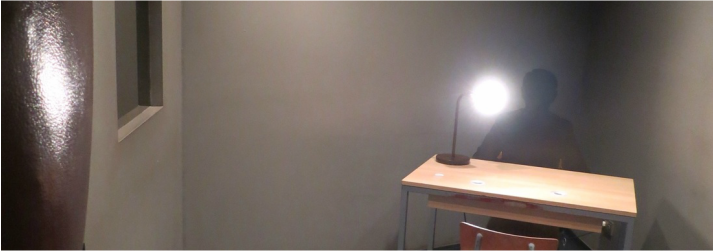The Roundtable
Welcome to the Roundtable, a forum for incisive commentary and analysis
on cases and developments in law and the legal system.
on cases and developments in law and the legal system.
 By Jonathan Stahl Jonathan Stahl is a junior at the University of Pennsylvania majoring in Philosophy, Politics, and Economics (PPE) with a minor in American Public Policy. Jeffrey Deskovic was a 16-year-old student at Peekskill High School in 1989 when one of his classmates, Angela Correa, was brutally raped and murdered in a forest nearby. Jeffrey caught the attention of local investigators when he seemed suspiciously emotional at a memorial service for Angela and fit the psychological profile of the perpetrator that an NYPD specialist had created. [1] Peekskill officers then visited the high school during the school day, asked Jeffrey to come with them to a nearby county’s police station where they interrogated him for at least six hours. Deskovic was subjected to abrasive behavior and intimidation by the officers, as well as a polygraph test. He eventually confessed to the crime while crying on the floor in the fetal position, after one interrogator told him that if he did not confess the other officers were going to enter the room and assault him. Deskovic was promised that after he confessed he could go home and would receive psychological counseling rather than jail time. [2] Jeffrey’s story is unfortunately one of many that highlight the importance of video taped interrogations. As a result of his coerced false confession and misconduct by both the police and the prosecutor, Jeffrey was convicted of Angela’s rape and murder despite negative DNA tests. He spent 17 years in New York State prisons until being exonerated in 2007. [3] After receiving financial compensation from New York for his wrongful conviction, he started the Jeffrey Deskovic Foundation for Justice, which advocates for criminal justice reform. I had the pleasure of interning there this summer and learning about his story.
One might think that it would be a no-brainer to videotape interrogations because it is a win-win for both suspects and law enforcement. Suspects feel secure that interrogators won’t employ intimidation or other shady tactics, or falsely testify regarding what happened in the interrogation room. Police officers could dispel doubt in court regarding the voluntary nature of confessions and avoid allegations of misconduct. In fact, over 92% of local police departments surveyed reported that videotaping interrogations either had no effect on interrogations or actually helped officers. 82% of those departments reported that after instituting videotaping policies, allegations of improper interrogations either remained the same or decreased. [4] Given the obvious benefits of videotaped interrogations for suspects, law enforcement agencies and the administration of justice overall, it could come as a surprise that around 40% of law enforcement agencies in the United States chose not to videotape interrogations or confessions in any case. Even more shocking, the most recent figures available suggest that only 12.2% of precincts that serve a population of 10,000 citizens or under document “at least some interrogations or confessions.” [5] However, a recent shift in policy on the Federal level could start a domino effect of new State and Local policies. This summer, the Department of Justice released a memo to all federal agents, assistant attorneys general, and US attorneys, establishing that unless there is a compelling reason to do otherwise, all criminal interrogations related to Federal cases will be videotaped. [6] Although this was seen as a victory among the criminal justice reform and innocence communities, there is still progress to be made. Lobbying groups and foundations like Jeffrey’s are fighting to institute videotaping policies on local levels, and hope that this announcement by the Justice department will help speed along the process to ultimately achieving nation-wide videotaping policies for all interrogations. [7] These videotaping policies not only promote fair treatment of suspects and a respect for their rights and liberties, but also are beneficial for law enforcement. 97% of precincts that have instituted videotaping policies have reported that these policies are overall beneficial, and perhaps if Jeffrey Deskovic’s interrogation was videotaped he would never have been wrongfully incarcerated in the first place. [8] If State and Local governments emulate the Department of Justice and institute mandatory video taping policies, it would be a win for law enforcement, suspects, and the preservation and fair administration of justice. [1] Jeffrey Mark Deskovic, “Wrongful Convictions – Systematic Causes and Suggested Remedies,” May 13, 2012, http://deskovic.org/mediafiles/file/JeffsThesis.pdf. [2] Fernanda, Santos, “Vindicated by DNA, but a Lost Man on the Outside,”The New York Times, November 25, 2007,http://www.nytimes.com/2007/11/25/us/25jeffrey.html?pagewanted=1. [3] “Exoneration,” Deskovic, 2014, http://deskovic.org/jeffs-story/exoneration. [4] William A. Geller, “Videotaping Interrogations and Confessions,” National Institute of Justice, April 9 1993, https://www.ncjrs.gov/pdffiles1/Digitization/139962NCJRS.pdf. [5] Ibid. [6] Carrie, Johnson, “New DOJ Policy Urges Agents To Videotape Interrogations,” the two-way, May 21 2014, http://www.npr.org/blogs/thetwo-way/2014/05/21/314616254/new-doj-policy-calls-for-videotaping-the-questioning-of-suspects. [7] Fernanda, Santos, “Vindicated by DNA, but a Lost Man on the Outside,”The New York Times, November 25, 2007,http://www.nytimes.com/2007/11/25/us/25jeffrey.html?pagewanted=1. [8] William A. Geller, “Videotaping Interrogations and Confessions,” National Institute of Justice, April 9 1993, https://www.ncjrs.gov/pdffiles1/Digitization/139962NCJRS.pdf. Photo credit: Flickr user Kris Arnold
0 Comments
Leave a Reply. |
Archives
May 2024
|
